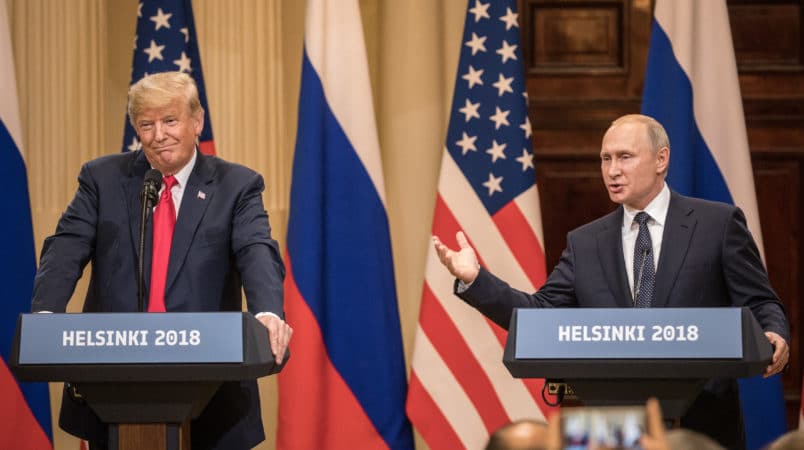UPDATE, JULY 21: I spoke with BBC Radio 5 Live and BBC Coventry on Friday afternoon about the latest around Donald Trump and Vladimir Putin:
Listen to BBC Radio 5 Live
The fundamental is that Donald Trump wants a partnership, if not an alliance, with Vladimir Putin. When his officials push back, Trump might take a half-step back. But, as soon as he has a bit of space, he takes a further step forward to get what he wants — which is that he and Vladimir Putin can rule the world.
Listen to BBC Coventry
If you are going to deal with Putin, you’ve got to go in with eyes opens, a clear head, and a firm resolve. Putin has certain interests in foreign policy. He is willing to pursue operations such as a nerve agent attack in the UK. He is willing to annex Crimea. He is willing to intervene in areas like the Syrian civil war, killing many civilians.
UPDATE 1515 GMT: Professor David Dunn of EA and the University of Birmingham speaks with talkRADIO about Donald Trump’s approach to Vladimir Putin:
Listen from 10:49 in 1400-1430 Segment
This is a symbol that the foreign policy process is broken. You have a person at the top who is acting like a maverick, a toxic combination of lack of preparation, an instinct to be disruptive, ignorance, and — when it all goes wrong — the willingness to bluff and to lie and to offer statements that are self-delusionary.
I spoke with the Australian Broadcasting Corporation, Austria’s Radio FM4 and BBC Radio Scotland on Friday about Donald Trump’s latest ploy in his partnership with Russia’s Vladimir Putin, an invitation to Putin to the White House in the autumn, and the wider issues from the Trump-Putin summit.
The conversations explain how Putin is maneuvering Trump to support Russian interests, and how the effort is fuelling the split between Trump and US intelligence agencies.
Watch ABC (Australia) TV:
The reaction to Trump’s invitation for Putin to visit the White House has revealed a ‘deep split’ within the US President’s administration, Professor Scott Lucas @ScottLucas_EA tells @yveyong #TheWorld pic.twitter.com/w9f9z6Welx
— ABC News (@abcnews) July 20, 2018
Listen to Radio FM4 at 13:12
Donald Trump is committed to an alliance with Vladimir Putin — even though there will be opposition from some Republicans in Congress. There will be opposition across much of the US political spectrum, even from his own agencies to Trump choosing Putin over NATO, the European Union, and alliances with other countries.
Listen to BBC Radio Scotland
You have Trump pitted against the intelligence agencies which he is supposed to supervise. This is not new. As far back as January 2017, Trump was calling his intelligence agencies “Nazis” because they were taking a different line on Russia. It is a split in the American administration which is the biggest crisis in international affairs since 1945.

